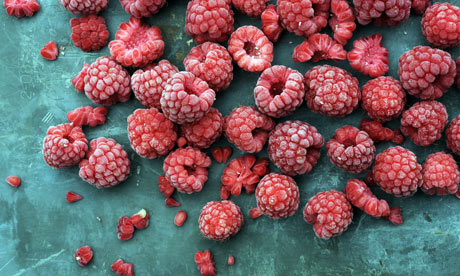
There's nothing like raspberries to brighten up a cold, dark January day. Of course, the fresh sort will be jet-lagged, scarily expensive and disappointingly flavour-free. But at this time of year frozen, preferably British, raspberries really come into their own.
The freezing process accentuates their sharp, fresh flavour, and they retain their seductive perfume, providing a refreshing contrast to stick-to-the-ribs winter food. They're perfect after Christmas when you can't work up any enthusiasm for autumn's apples and pears, and clementines and satsumas are turning dry and fibrous.
Why are they good for me?
As fruits go, they are relatively low in sugar (fructose), so for anyone who wants to lose weight, this makes them a wiser choice than, say, a banana or a mango. As a good source of vitamin C, they also help the immune system.
Raspberries are also a really rich source of naturally occurring flavonoid and phenolic compounds. These valuable micronutrients have an antioxidant effect, which helps neutralise changes in cells that might lead to illness and disease. Research suggests that these substances in berries can reduce the spread of cancer and help brain cells function properly.
Where to buy, what to pay
Thanks to the downmarket image of frozen food, raspberries – regarded as an aristocrat among fruits when fresh – are surprisingly affordable when frozen. Farm shops that have stored their summer harvest, unpromising looking freezer food shops and foreign discount chains are particularly good places to buy them. Aim to pay no more than £2.50 for 500g: that's less than half the price of the fresh summer equivalent.
• Joanna Blythman is the author of What To Eat (published by Fourth Estate). Order a copy for £11 with free UK p&p from guardianbookshop.co.uk or call 0330 333 6846

